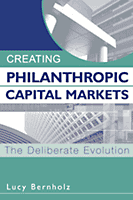OK, I've been busy and that's why there hasn't been much posting going on. I've been walking through a Gate-enhanced Central Park, writing several papers, giving a few talks, preparing for a trip to Israel, and learning to luge in Muskegon, Michigan.
And I've been reading a lot. This last month included two histories of public broadcasting, one analysis of healthcare in America (
Critical Condition) and a history of videogames (
Joystick Nation). I also read
Subwayland, a collection of New York Times columns, some great fiction (
Case Histories) and Amos Oz's memoir. I'm now onto Richard Bradley's
Harvard Rules, which I complement with daily
New York Times coverage of President Summers' "foot-in-mouth" problems.
On the magazine front, I'm caught up on the last four months of New Yorkers, Harpers, Atlantic Monthlies, Wired, Dwell, Inc., Foundation News, Philanthropy, Worth, Bloomberg Wealth Manager, Fast Company, and Business 2.0.. I'm keeping my head above water on the weeklies - Chronicle of Philanthropy, Business Week, and Fortune, and ever so grateful that I let
The Economist lapse. I've got FeedDemon, Bloglines and iPodder tracking the audio waves and wires for me - to the best of my ability (given that I have a family, dog, and job) I'm pretty tuned in.
Why am I telling you this? Because I read a lot and when I tell you something is "the best thing I've read lately" it means there were a lot of other choices. So pay attention.
Katherine Fulton and Andrew Blau (with help from Gabriel Kasper and others at The Monitor Group) have just published
Looking Out for the Future. Go get it now. There is a main paper that outlines the state of the field, a very cool "learning journey" that helps you get more info on sources and examples, and a memo on changing the field that just might. All of it is available online at
www.futureofphilanthropy.org, and while it is copyrighted (clear throat and make pitch for Creative Commons) its available for free use with attribution (there
is still hope where intellectual property is concerned).
The paper does several things: It helps orient us in the current ecology of philanthropy and learn what and where there is real innovation. It presents a convincing argument about why it matters that we see the whole of philanthropy and not just the place in which we work, the funders we know, or the causes we give to.
The paper is rich and deep on the state of American philanthropy. It also is clear about the global nature of philanthropy and refreshingly honest on its own shortcomings in capturing the world's story. Fulton and Blau invite the reader to constantly reconsider the shifting lines between local and global. They capture the humanity and excitement of philanthropy. By noting the endless ways that cultural traditions interact with political and economic systems they begin to show how philanthropy reflects our expectations of ourselves and each other. The paper points us to the several possible futures (scenarios) and asks each actor to consider their role in the larger whole.
The challenge of changing philanthropy - of improving it, making it more accessible, more diverse, more reliable - is truly daunting. Fulton and Blau take it on. They may not have all the answers, but they've asked the right questions. By clearly outlining the barriers to change they have upped the ante several times for all who claim to be engaged in systems change.
Quite simply, it is the most important piece on philanthropy that I've read lately. Go get it.
---
And, yes, I remember that last month I told you to read Andrew Blau's paper on changes in
The Future of Independent Media. Two months in a row. I don't know whether to hope Blau keeps this up and wait to see what April brings or hope he knocks it off and gives the rest of us a chance to catch up.




